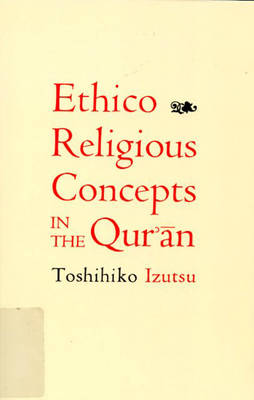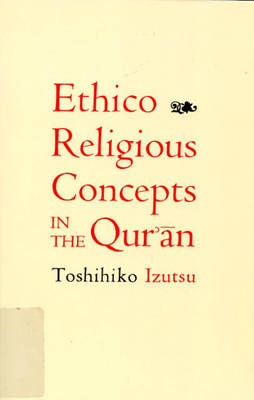
- Afhalen na 1 uur in een winkel met voorraad
- Gratis thuislevering in België vanaf € 30
- Ruim aanbod met 7 miljoen producten
- Afhalen na 1 uur in een winkel met voorraad
- Gratis thuislevering in België vanaf € 30
- Ruim aanbod met 7 miljoen producten
Zoeken
€ 51,95
+ 103 punten
Uitvoering
Omschrijving
In the Ethico-Religious Concepts in the Qur'án Toshihiko Izutsu analyzes the guiding spirit of the Islamic moral code, the basic ethical relationship of man to God. Izutsu asserts that, according to the Qur'anic conception, God is of an ethical nature and acts upon man in an ethical way. The resulting implications for man are enormous, requiring devotion not merely to God but to living one's life ethically. Izutsu shows that for the Qur'an our ethical response to God's actions is religion itself; it is at the same time both ethics and religion. Izutsu explores these themes by employing ethnolinguistics, a theory of the interrelations between linguistic cultural patterns, to analyse the semantic structure of major concepts in the Quar'an. Islam, which arose in the seventh century, represents one of the most sweeping religious reforms ever to appear in the East. The Quar'an shows in vividly concrete terms how time-honoured tribal norms came into bloody conflict with new ideals of life, and finally yielded to the rising power. This transitional epoch is of particular importance in the whole of Islamic thought, a time during which the key terms of a traditionally fixed system of values were transformed in their connotative structure, modified in their combinations, and finally integrated into an entirely different system. Originally published in 1959 as The Structure of the Ethical Terms in the Koran and revised under the current title in 1966, this 2002 reprint makes this classic work of Islamic studies once again available.
Specificaties
Betrokkenen
- Auteur(s):
- Uitgeverij:
Inhoud
- Aantal bladzijden:
- 292
- Taal:
- Engels
Eigenschappen
- Productcode (EAN):
- 9780773524279
- Verschijningsdatum:
- 6/06/2002
- Uitvoering:
- Paperback
- Formaat:
- Trade paperback (VS)
- Afmetingen:
- 154 mm x 228 mm
- Gewicht:
- 421 g

Alleen bij Standaard Boekhandel
+ 103 punten op je klantenkaart van Standaard Boekhandel
Beoordelingen
We publiceren alleen reviews die voldoen aan de voorwaarden voor reviews. Bekijk onze voorwaarden voor reviews.








